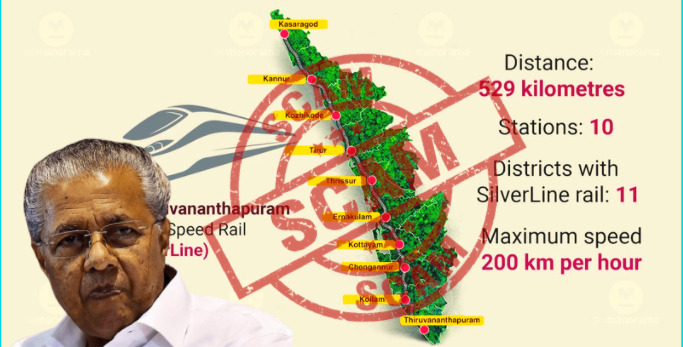The Pinarayi Vijayan government in Kerala has found itself in the middle of a raging storm after both opposition and masses have turned against its new SilverLine project. The semi high-speed railway project is Vijayan’s ambitious project to date, expected to cost Rs 63,940 crore. However, the feasibility of the project, coupled with shoddy project reports, ecological impact, and escalating financial burden on the exchequer has raised more than a few eyebrows.
According to news reports, the 529.45-km railway line will link Thiruvananthapuram in the south to Kasaragod in the north, covering 11 districts through 11 stations. Currently, it takes 12 hours to cover the said distance, which will be cut to less than four hours with the trains travelling at a speed of 200 km/hr.
Vijayan government not allowing environmental assessments
The project is being developed by Kerala Rail Development Corporation Limited (KRDCL) often known as K-Rail, in close cooperation with the Kerala government. However, the Left government has not allowed proper assessments to be completed before the project can move ahead.
The Rapid Environmental Impact Assessment (REIA) of the project was completed earlier in 2020 by the Thiruvananthapuram-based research institute Centre for Environment and Development (CED). However, the Vijayan administration did not allow CED to conduct the Environmental Impact Assessments (EIA).
Where will the granite come from and what about the Western ghats?
Reportedly, K-Rail will raze 9,314 structures in pursuit of the project while estimated 10,000 families will need to migrate from the project zone. Out of 1,383 hectares needed to be acquired, 1,198 hectares will be private land. Moreover, some experts have argued that the project can have serious ramifications on the delicate ecology of the Western Ghats.
In the absence of a thorough DPR, there is no clear calculation about the amount of granite required to complete the project especially when the number of quarries in Kerala has drastically reduced over the years.
In 2010-11, there were 3104 quarries while in 2020-21, the number of quarries came down to 604, and thus questions are rightly being asked how the state government seeks to address the issue.
Experts argue that a mere 3.1-meter breakwater scheme in the Vizhinjam international port, being planned for years, will consume almost 75 lakh tonnes of granites. Thus the amount of granite required to prop the SilverLine project through embankments, tunnels, bridges, and viaducts will be enormous.
Opposition against the move
A petition signed by 17 Opposition MPs from the state said the project was an “astronomical scam in the making” and would sink the state further into debt. The petition addressed to the Union Railways Minister, said the project was financially unviable and would lead to the displacement of over 30,000 families.
Akin to experts demanding the Vijayan government to repair the existing Rail network, the central government has suggested the same.
According to Union Minister of State for External Affairs V. Muraleedharan, Union Minister for Railways Ashwini Vaishnaw had assured the State government that the existing railway system would be strengthened to replace the SilverLine project. However, the State government had hampered the development of the railway in Kerala.
Metroman, E Sreedharan who planned and developed the revolutionary Delhi Metro network termed the project “ill-conceived” and defectively planned. He said the present proposal needs a lot of correction including its basic track width.
Meanwhile, the Kerala Pradesh Congress Committee (KPCC) President K Sudhakaran has also called out the Vijayan government by stating, “We see the SilverLine issue as a matter of life and death for Kerala. Not even one per cent can justify this plan. It is arrogant for the Kerala government to say that the project will be implemented.”
Sudharkan further remarked, “The Detailed Project Report (DPR) of the SilverLine has not yet been seen. From the very beginning, the government has been deceiving the people. The people of Kerala will not benefit from this project except disaster. We will fight against this project legally till the end,”
After the Vijayan government’s incessant request, the Cabinet had approved an administrative sanction to get Rs 2,100 crore from the Kerala Infrastructure Investment Fund Board (KIIFB), the central investment arm of the government. However, how the Kerala government expects to raise the remaining amount is still a mystery.
